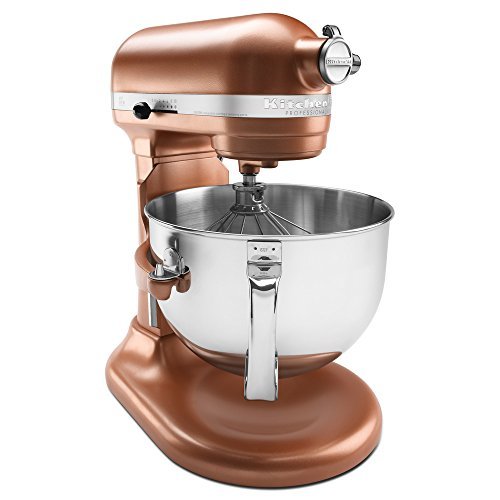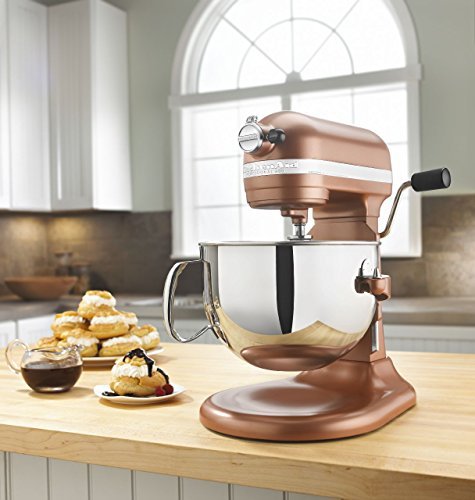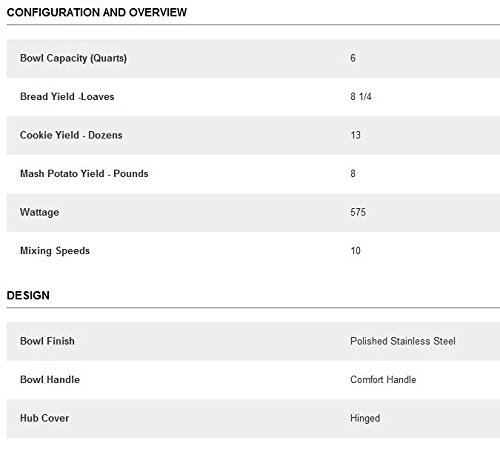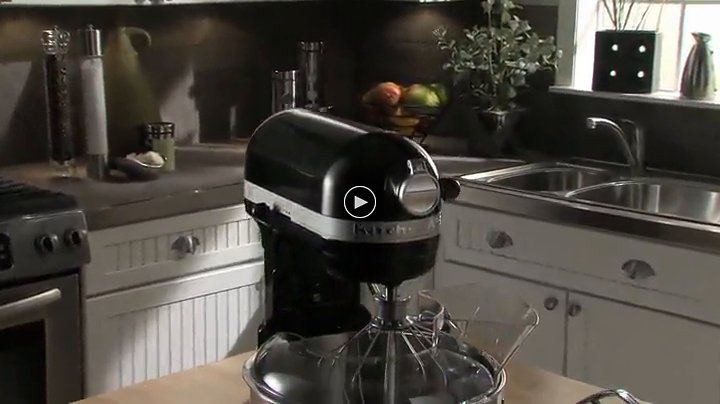







Measurements H: 16.5, W:11.3, D:14.6
Color:Copper Pearl The Professional 600 TM has a powerful motor that is crafted for commercial-style performance, the direct drive, all-steel gear transmission delivers unyielding power for professional results. The mixer can effectively mix up to 14 cups of all-purpose flour per recipe and produce up to 8 pounds of mashed potatoes. The Soft Start mixing feature helps minimize ingredient splatter and flour puff with gentle acceleration to selected speed after start-up. Electronic Speed Sensor monitors operation to maintain precise mixer speed. Commercial-style motor protection automatically shuts off the mixer when overload is sensed to protect the motor. Durable all-steel gears provide reliable service. The mixer includes a 6-quart-capacity stainless-steel mixing bowl with a contoured handle, as well as a professional wire whip, a burnished flat beater, a spiral dough hook, and a one piece pouring shield. Its multipurpose attachment hub with a hinged hub cover flips open to allow for easy installation of attachments. The Professional 600 Series bowl-lift design raises the bowl into the mixing position, and its solid, truly seamless one-piece motor head design is easy to clean and comes in a variety of fashionable colors.
When I bought the recent Costco model, I was intrigued to find out what was hiding behind the Costco brand Kitchenaid model. Interestingly enough, it turns out to be a Williams-Sonoma 610 model. This got me asking what is the difference to the 600 model, and why does a 610 model even exist? After taking my Costco model apart, doing a significant amount of research, and acquiring the 7 qt model and investigating it, I came to the following conclusion:All models, the 600, 610, 620, 6000, 6500, 7qt residential, 7 qt commercial, and 8 qt are essentially all the same models. They have the exact same form factor and with the exception of the 6000, fit the same beaters and bowls. They differ mainly in motor, transmission, bowl, and beater (that needs to match bowl size). And some models have plastic knobs whereas other have metal ones.600: This is the base model. A few years ago Kitchenaid changed the transmission case, that holds some sprockets in place, to plastic. This was changed back to the old metal cast case from the 6 Series now. It has a 575W AC motor.610: Is the same as the 600 with the same transmission, but a different 590W AC motor. I doubt that the extra 15W this motor is rated for makes a difference. The 600 model collected a lot of critic from people doing heavy doughs. My assumption is that Williams-Sonoma requested a more robust motor, perhaps with higher torque. The control electronic is a very simple triac motor control. It looks similar to the 600 control, but has the hall speed sensor soldered on. It also misses the IC from early 600 models. The wire whip is not the one from the 600, but the one from the 7 and 8 qt models. The Costco model has metal flat and hook beaters instead of the coated ones.620: Is a 610 in fancy colors.6000 HD: It has an entirely different transmission and motor than the 600, 610, or 620. My assumption is that the transmission is the same as in the 6500, 7qt and 8 qt models. The motor may or may not be the same. The 6000, like the 6500, is rated as 1 HP. It could be the same motor from the 7 qt and 8 qt and might be electronically limited or simply derated on paper. The bowl, and therefore the beaters, are totally different than on the 600 models. The bowl is taller and narrower. Because the pins that hold the bowl are narrower, you can only fit 6000 bowls, but not those from the 600, 6500, or 7 qt, 8 qt models. This is by the way also the old Costco model.6500: Appears to be a 7 qt model, derated for 1 HP with a fancy 6 qt bowl. The cover of the planetary gear facing the bowl looks more robust.7 qt: Its motor is rated for 1.3 HP. The 7 qt appears to fit all the bowl from the 600, I actually tried this out, even with 7 qt beaters. In reverse, the 600 fits bowl and beater of the 7 qt.8 qt: In all likelihood a 7 qt model with a bigger bowl and a finger guard. Motor is rated the same. It should fit all 7 qt and 600 model bowls.The 7 qt and 8 qt also exist as commercial versions with an orange power cord and a commercial use warranty. Otherwise, my assumption is that they are the same as the residential models.Confused, yet? What should you pick?In my opinion the biggest differentiator is the AC vs DC motor, not because the motor is AC or DC, but because of torque, transmission, and speed control design. The DC motor of the 6000, 6500, 7 qt, and 8 qt models is significantly beefier than the one of the 600 Series. The DC motor uses a digital PWM speed control that holds speed exactly and increases torque as needed. The 6000 and 6500 may or may not have the same motor as the 7 qt and 8 qt models, but are rated with 25% less power. As I said, this might be paper derated or electronically limited, or actually it has a slightly smaller motor. The DC models also are significantly quieter than the transmission and motor combo of the 600.The 600, 610, and 620 use a very primitive triac control. The 610 and 620 have a slightly more robust motors but use the same transmission as the 600. The triac control will not increase torque as well while holding speed, which specifically will be noticeable with heavy doughs. These models are very noisy. Because of their simpler design, the 600 Series is cheaper to repair than the DC models. Sprockets are a couple of bugs and even the speed control is inexpensive.The 6000 HD appears to be the oddball when it comes to bowls. It uses narrow bowls that need their own narrower beaters.All other models use the same bowls. Now, it might make little sense to put an 8 qt bowl into a 600 where the motor is not strong enough. The dough hook might be the same, but you need more force. The wire whip has more wires on the 610 and up models. I do not see why it should not work on the 600. The real difference is in the flat beater. While you mostly can use the larger (flat) beaters with smaller bowls, like use a 7 qt beater with a 6 qt bowl, if you use a 6 qt beater with a 7 qt bowl, you just do not reach the top of the bowl. The 3 qt bowl should fit all models, even the 6000 model, because it has holes for the narrower pins, and comes with its own beater.The dough hook exist in stainless, aluminum and coated aluminum. The flat beater exist as stainless, aluminum, coated aluminum, or with a silicon lip that saves you from interrupting and scraping the bowl walls. The wire whip is always stainless. Only stainless and coated aluminum can be washed in the dish washer. Some people complain about the coating flaking over time. While various packets exist that bundle coated or none coated versions, only the commercial 7 qt and 8 qt version contain stainless beaters. Beaters are quiet pricey but can purchased after market, even from third parties.Depending on the sale you are getting, the price difference between the models might not be actually that much. I would not get a 6000 because of the weird bowl shape that locks you in. I found the price difference between the 7 qt and 600 models to be about $100 with the right deal, the 6500 actually could be more expensive. The 600 comes in all kinds of colors, of this is important to you. All other models are limited in colors. I decided for the 7 qt model because I wanted to make pizza and bread doughs and simply bought 5 qt and 3 qt bowls for the smaller jobs. I would buy an 8 qt bowl if I ever needed it.I hope this information makes it easier for you to make your own decision.On the picture, left the 7 qt model, and right the Costco 610 model.
Most of the bad reviews were written 6 or 7 years ago. I am surprised that Amazon allows these outdated reviews to remain on this site. Not very responsible on the part of Amazon! While the basic design on KitchenAid mixers does not change over time, the construction certainly does.MODEL NUMBERS: Also notice the specific model number for each review. Since KitchenAid doesn’t change the exterior appearance, you will see that many people are reviewing outdated products. The current production of this mixer (as of January 2014) is the KP26M1X the letters after that are color indicators. Most people are NOT reviewing this current model mixer. You would not know that unless you checked the KitchenAid web site. So if you’re thinking of purchasing now, look for the KP26M1X, or if you’re purchasing later check the web site for the most current model number.DURABILITY: The mixer now has all metal gears and metal gear box. This unit has not had plastic gears for 5 years. The other common thread I saw in the negative reviews is the owners apparently either did not read the instructions, or thought that as bakers, they knew “better” than the instructions. (1) Never knead dough on a higher speed than “2”. With other mixers which have less powerful motors and that old HOOK dough hook, the mixer had to use a higher power to produce the same torque. This mixer utilizes a new style of dough hook and the power of the mixer do a great job on the number 2 speed setting. And (2) do not knead the dough longer than 2 or 3 minutes. I have been making bread and pizza dough for years, and at first I was skeptical about the knead time as well. But after reading some of these reviews about motor overheating, once the dough was thoroughly mixed, I only let it knead for two minutes. It turned out perfect every time. I use mine several times a week and it works perfectly every time.NOISE: I agree that it makes more noise than my Artsian model which I used for 20 years. The metal gears probably do create more contact noise and the mixer could possibly be sound insulated, but I suspect that would trap heat inside the motor–which you would not want to do. It is not so loud as to be objectionable (not to me at least), but it makes more noise than the Artsian does.PERFORMANCE: Someone complained that the beater leaves unmixed residue in the bottom of the bowl. Again, read the manual. There is an adjustment point where you can raise or lower the bowl slightly when it is in the “up” position. Mine was fine right from the factory, but some adjustment may be necessary. I make crepe batter frequently, and used to prepare it with a simple whisk. Since this mixer is so heavy, and since I have space to leave it on an island counter now, I started using the mixer to prepare crepe batter. I simply put all the ingredients in the bowl at one time, click on the whisk, and walk away. In a minute or two the batter is perfect - nothing left un-mixed in the bottom of the bowl. Much easier than doing it by hand and the clean up is the same as if I used a metal bowl and a hand whisk. Perfect!ACCESSORIES: There is a beater that KitchenAid sells separately that I feel should be standard on all their mixers. It includes a silicone “scrapper” attached to one side of the beater blade. It scrapes the bowl as it mixes. This would obviously not work well with heavy batters (like bread), but for mixing thin batters it is ideal. I have ordered this, which you can get from Amazon. Be careful to order the correct size, the KP26M1X series has a 6 Qt. bowl. I know there are other brands that make this beater, but they are within a couple of dollars of the KitchenAid and I know the KitchenAid brand will fit the bowl correctly so why take a chance. Also, aftermarket beaters with the scraper on both sides may create too much drag on the motor.CONVENIENCE: This mixer uses the lift mechanism rather than the “tilt head” to remove the beaters from the bowl. I do find this to be less convenient than the Artisan and I wondered what the advantage could possibly be. Then I realized that with a 6 quart bowl, the beaters are much larger than the Artisan and would not clear the bowl when attempting to tilt the mixer back. That’s the only reason I can see that there is the lever to raise and lower the bowl. It is slightly more inconvenient to change beaters, but once you get used to it, it’s hardly noticeable. The pouring shield was a nice addition, as I did not have that with my Artisan and you know what a mess that can be if you’re not careful sometimes.As you can tell, the mixer is very heavy and large. That makes it hard to store, so it’s best if you have space to leave it on the counter. I have discovered that since it is on the counter all the time now, I use it for everything. I also have a KitchenAid hand mixer that was once the “go to” mixer, but I haven’t even reached for it since this one is always available now. So leaving it on the counter is an unexpected convenience. As I said, I have plenty of counter space; that has not always been the case so it’s something you would want to consider.Another good point is that all the power hub attachments that fit the Artisan will also fit this model. I have the grinder attachment that I have used for years to grind my own beef, so it was good to know I would not have to purchase another.I feel prospective consumers need to read reviews written on the CURRENT model numbers during the CURRENT production cycle. Why would a review for a model made 14 years ago apply to the model being produced today? Just because the shell looks the same? It doesn’t make any sense to me. I do believe that KitchenAid listened to the remarks about earlier models and used those to improve on the current model.If the mixer does fail to be as durable as my old one, you can bet I’ll come back here and let you know and change the review accordingly. But for now, it’s everything I hoped it would be.
Product was great. Packaging was awful.
Don’t bother with this model! You are getting a large machine but not the big power! For a few dollars more or even sometimes less you should invest in a mixer that has a DC…
I love it
Wife and daughters love it.
Stick with the smaller mixer and just do smaller batches. This machine does not do what I bought it for - mixing large batches of cookies/breads.
Mixes thoroughly. All baked goods are coming out perfect. Love the freedom to prepare Foods while the mixer is doing its thing. Awesome!
Best product on the market for home use. bought this for a wedding gift, They loved it.
Love this micer. Love the color. Works very well and motor is very strong making almost any job very simple.
I purchased this mixer through QVC 4 yrs ago. after 4 yrs the gears are a problem and it doesn’t run.
comments powered by Disqushonestly… I’ve used kitchen aid for more than 25 years first learned about the power of their machines when I worked in restaurants so when I finally was able back in 2008 I…